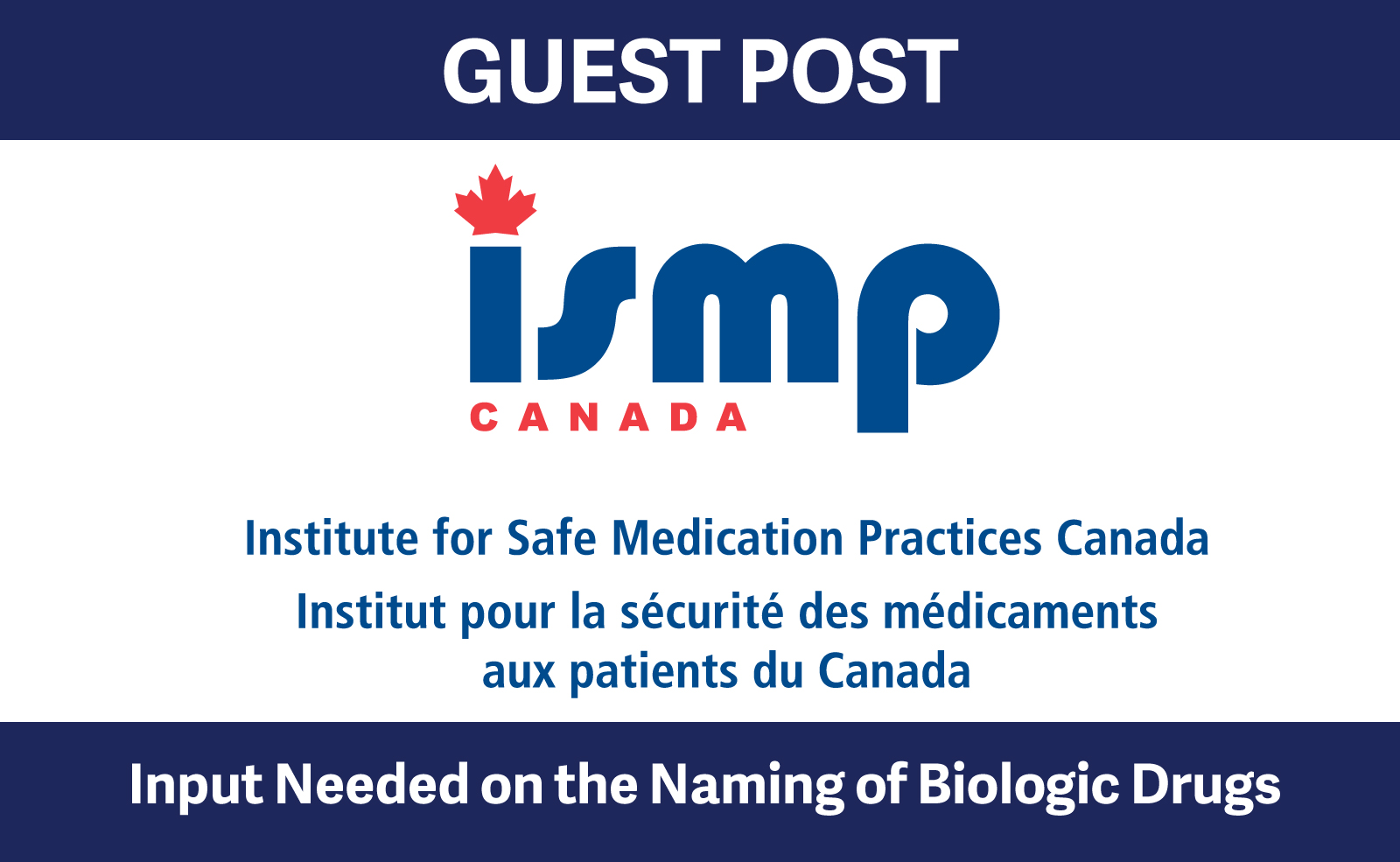Guest Post: Input Needed on the Naming of Biologic Drugs
Health Canada and the Institute for Safe Medication Practices Canada are seeking input from healthcare providers, consumers, and other interested and affected stakeholders on different approaches to the naming of biologic drugs, including biosimilars, in Canada.
With the entry of biosimilars into the Canadian market, the number of biologics sharing a non-proprietary name is increasing. Due to the complexity and variability of biologics, it is important to be able to distinguish among biologics that share the same non-proprietary name for prescribing, dispensing, documentation, and adverse drug reaction reporting.
The consultation aims to gain insight into stakeholder views on the practical impacts of different approaches to the naming of biologic drugs and biosimilars throughout the medication-use process.
Stakeholders are invited to provide feedback on three options for naming of biologics through a series of five (5) questions. The questionnaire has been developed collaboratively by the Institute for Safe Medication Practices Canada and Health Canada. Administration of the questionnaire and analysis of responses will be performed by ISMP Canada.
The consultation runs from January 18 to February 9, 2018, and will be available on ismp-canada.org.
Results of the consultation will be used to:
- understand the impact of different proposed approaches to biologic drug naming and the perspectives of healthcare providers, consumers, and other interested and affected stakeholders, and
- inform Health Canada’s policy decision on a naming convention for biologic drugs.
Biologics and Biosimilars
A biologic is a drug that is produced from living organisms or their cells. Biologics are generally larger, more complex, and inherently variable when compared to chemically produced pharmaceuticals.
A biosimilar is a biologic that has been demonstrated to be highly similar to a biologic drug that was already authorized for sale (known as the reference biologic drug).
Biosimilars are authorized in Canada based on a demonstration of similar quality, safety, and efficacy to the reference biologic drug, such that clinically meaningful differences between the biosimilar and the reference biologic drug are not expected when used as authorized.
Unlike with chemically produced generic drugs, authorization of a biosimilar by Health Canada does not indicate equivalence with its reference biologic drug. In Canada, “interchangeability” is decided provincially or territorially and refers to the ability for a patient to be changed from one drug to another equivalent drug by a pharmacist, without the intervention of the doctor who wrote the prescription. (Note: Interchangeability is defined differently in other jurisdictions, such as in Europe.)
For more information refer to the detailed document on this consultation at https://www.ismp-canada.org/biosimilars/Naming-of-Biologic-Drugs-Consultation-NoticeEN.pdf.
Consultation Questionnaire
The consultation will seek your views on the most appropriate proposed approach to the naming of biologic drugs in Canada in order to support prescribing, dispensing, adverse drug reaction reporting, and information system or database needs. In addition, you will be asked to consider the various factors associated with drug naming and identification in your practice setting and to provide reasons to support your views on why a particular naming approach should or should not be taken in Canada. You will also be invited to offer alternate suggestions.
Email [email protected] to join the distribution list and receive and e-mail with the questionnaire on January 18, or visit ismp-canada.org.
Please help share this opportunity to provide input on the Naming of Biologic Drugs with your colleagues and other health professionals by inviting them to participate.
Join into the conversation on patient safety and the naming of biologic drugs

Valentina Jelincic, Project Lead, ISMP Canada
Valentina is a pharmacist and consultant with varied experience in the private and public sectors and with professional associations. Her focus is directed towards pharmacy practice; medication safety; planning, management and administration; and medical writing.
- Guest Post, ISMP, Patient Safety

 Share
Share



